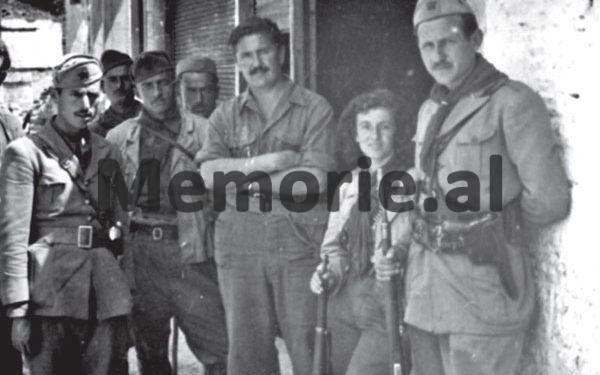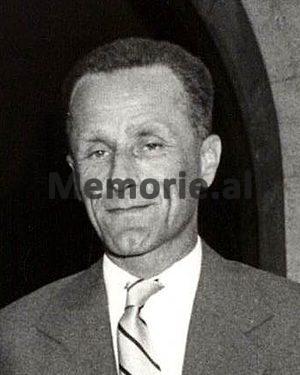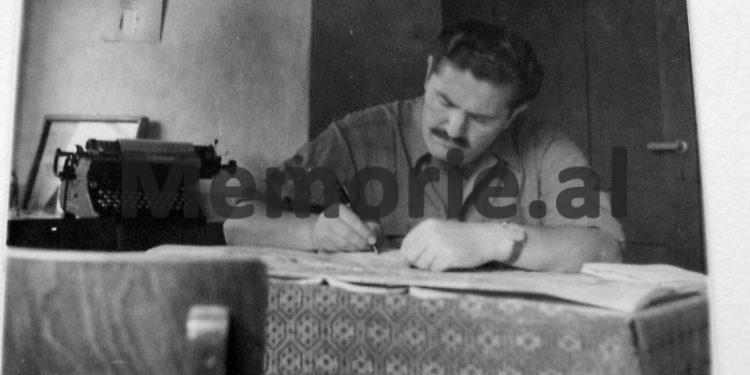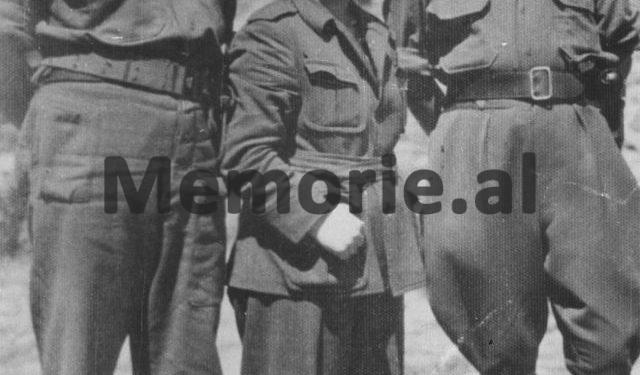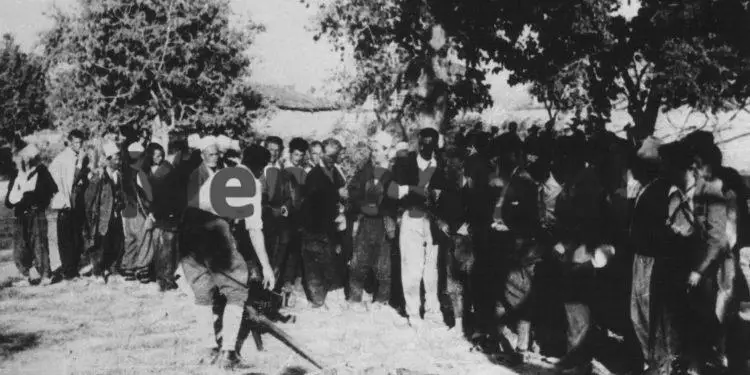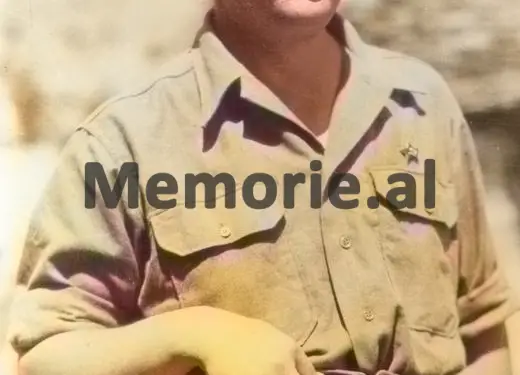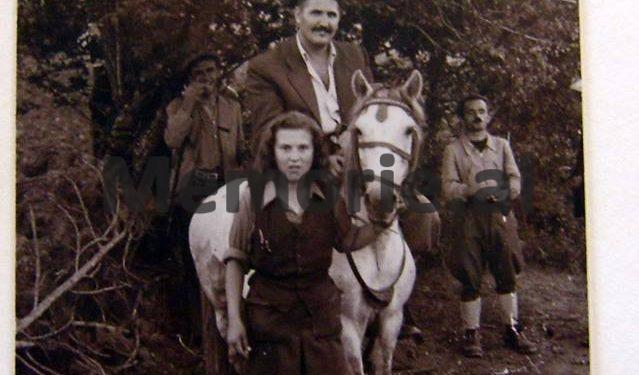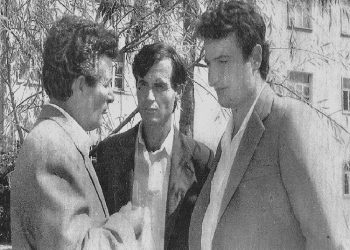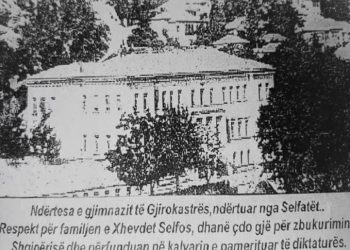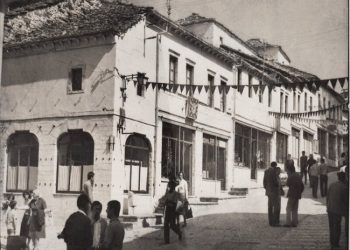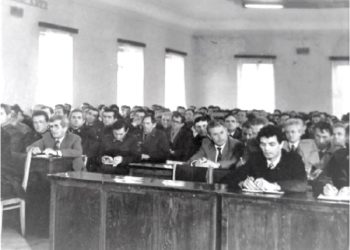Dashnor Kaloçi
Second part
Memorie.al publishes the unknown memoirs of Njaz Dizdarevic, the former chairman of the Communist Youth of Yugoslavia for Bosnia and Herzegovina during World War II and later a member of the Central Committee of the Yugoslav Communist Party, who in 1944 was sent by Josif Broz Tito as his envoy in Albania to Enver Hoxha, as an instructor in charge of youth and army affairs. Rare testimonies of Tito’s missionary published in 1988 in Yugoslavia at that time, regarding the main events of the period of the ‘Anti-Fascist National Liberation War’ in Albania where he himself was a witness, refuting Enver Hoxha for what he had written in the book his, “The Titoists: published in 1982 in Tirana, such as: the shooting of Ramize Gjebre, the Plenum of Berat, the role of Enver throughout the war, his relations with the Yugoslav missionaries and his closest collaborators, as Nako Spiro, Koci Xoxe, Sejfulla Malëshova. etc.
First of all, I wanted to say about Enver Hoxha that it is characteristic for him that what he writes in the book “Titists”, does not correspond to the truth and reality of the time in question. Thus, his book is based on general facts, and most do not even deserve much attention and space. He writes at length about the Berat Plenum of the Central Committee of the Communist Party of Albania, which was held in November 1944. Enver Hoxha does not accidentally confuse some facts, some of which are true and some half true. This was done for propaganda purposes that served him for the period when he was writing the book. This Second Plenum of K.Q. of the SNP in Berat, in his book “The Titoists” is given as the main evidence of the interference of the Yugoslavs and the Central Committee of the Communist Party of Yugoslavia in the internal affairs of Albania. “Through this, through unilateral assessments and falsifications, false accusations have been made against us.”
This is what Njaz Dizdarevic, the former chairman of the Communist Youth of Yugoslavia for Bosnia-Herzegovina during World War II and later a member of the Central Committee of the Yugoslav Communist Party and after the war, wrote in his memoirs. pension) with other high party duties, who in 1944 was sent by Titua as his emissary in Albania (instructor for youth and army affairs), to Enver Hoxha, through his memories sheds light on some of the dark sides of the National Liberation War and the relations of Tito’s envoys with the senior leadership of the SNP and personally, the Commander-in-Chief, Colonel-General Enver Hoxha, whom he accuses of fraud and forgery that he has done to those events that Hoxha wrote them in his lifetime. Who was Enver Hoxha, what was his role and that of the senior leaders of the Albanian Communist party and those of the General Staff of the partisan Army during the years of the War in Albania. These questions shed light on the memories of former Yugoslav high-ranking official and Tito missionary Njaz Dizdarevic (his brother, Rauf Dizdarevic, was Yugoslavia’s foreign minister before its dissolution), who were attached to the leadership of the high communist partisans of Hoxha.
Continued from the previous number
We convinced Nako Spiro and other members of K.Q. of the SNP that his dismissal would be a mistake, especially if one considered the imminent liberation of Albania and the international situation. Enver Hoxha did not remember, for example, the fact that he begged Stojnic to help him draft the Plenum paper. While I was translating, I know that for a few nights we sat with Enver Hoxha and sometimes, he asked us to write some parts of the paper to us. It was more about that part of the paper which talked about the strategy of the National Liberation War and the final phase, about the Antifascist Front, the mass organizations, their role and especially about the organization of the state and the army. These were certainly not our personal ideas, but the fruit of the experience of our National Liberation War. (We from Visi had brought materials for the organization of large military units, the national committee, the front, the women’s organization. All these were submitted by the Albanian leadership.) If the memory does not betray me, it is clear from the diary that we invested more in movement against sectarianism which was very present in the context of building revolutionary power etc. Enver Hoxha does not say a word about all this, because he does not want to because that would blow up all his work, to argue the “intervention of the Yugoslavs”, in the internal affairs of Albania, as well as the accusation that all The attack, both before and after the Berat Plenum, was directed against the SNP and the Secretary General “, recalls Njaz Dizdarevic, regarding the events of the Berat Plenum, refuting Enver Hoxha, who in his works and especially in the book” Titists has accused the Yugoslav mission that took part in that meeting, as if they had wanted to remove Enver from the post of Secretary General of the SNP.
“Why didn’t we remove Enver to Berat?”
Regarding the events of the Berat Plenum and the reasons why the members of the Politburo wanted to remove Enver Hoxha from the leadership of the Party and the insistence of the Yugoslavs to keep Enver in that post, Njaz Dizdarevic reminds again: “In the concrete case of the withdrawal from Albania by Dusan Mugosha and Miladin Popovic, our mission finally abandoned the practice of identification as “the biggest”, which led to disagreements between us and some individuals in the Albanian leadership. This was more noticeable in Berat, in the actions to remove Enver Hoxha. Despite the pleas of our Albanian comrades that we insist on removing Enver, we, instead of interfering in their affairs, asked them to solve their own problems regarding the leadership. This is evidenced by this fact in my diary: Nako Spiro now says this: You Yugoslavs with Miladin and Dusan, you interfered in our internal affairs when you should not, and now that you have to do it, “give help from afar”. Now someone has to come to have full power to fix everything. ‘ This statement of Nako came at the end of a discussion where he insisted that we place ourselves on the side of those who wanted to remove Enver Hoxha. Perhaps this could have been a motive that after the liberation, oriented Nako as a minister of cooperation more with the Russians, trying to hinder the Albanian-Yugoslav economic cooperation. We could not fulfill the request of our Albanian comrades to join those who wanted to remove Enver Hoxha, because that was not the task of our mission. Our mission was clear to the task assigned to it. He had to cooperate with his Albanian comrades in the fight against the German forces that were in Albania and then cooperate until the final victory over fascism and the liberation of Albania. In this context, we had to give all our experience in the Albanian leadership, considering the attitudes of the great powers towards Albania and the reaction of the Albanian reaction. But on the other hand, I cannot hide that given the impact of the disputes between the two countries and our peoples in their history, I rejoiced as I thought you were opening a new page in these relations, laying them on sound foundations. Why not the union between Albania and Yugoslavia, as long as this was in the desire of the Albanian people. Among other things, this became more pronounced when the danger from Greece began to appear. In a report I was sending at the time K.Q. of the KLP, I wrote to you: wherever we go, they openly express to us the desire to unite Albania with Yugoslavia in a federation. This is also influenced by the hatred towards the British and Americans that they openly manifest. “He is afraid that England will do to Albania what it did to Greece”, recalls Njaz Dizdarevic, regarding the insistence of Nako Spiro in the Berat Plenum, who asked the Yugoslav mission to insist on the removal of Enver Hoxha and the great pro-Yugoslav propaganda he had made popular with the Albanian Communist Party, so much so that people openly expressed to Tito’s missionaries the idea of uniting Albania with Yugoslavia into a single federation.
Why didn’t the British land in Saranda?
This statement of Nako came at the end of a discussion where he insisted that we place ourselves on the side of those who wanted to remove Enver Hoxha. Perhaps this could have been a motive that after the liberation, oriented Nako as a minister of cooperation more with the Russians, trying to hinder the Albanian-Yugoslav economic cooperation. We could not fulfill the request of our Albanian comrades to join those who wanted to remove Enver Hoxha, because that was not the task of our mission. Our mission was clear to the task assigned to it. He had to cooperate with his Albanian comrades in the fight against the German forces that were in Albania and then cooperate until the final victory over fascism and the liberation of Albania. In this context, we had to give all our experience in the Albanian leadership, considering the attitudes of the great powers towards Albania and the reaction of the Albanian reaction. But on the other hand, I cannot hide that given the impact of the disputes between the two countries and our peoples in their history, I rejoiced as I thought you were opening a new page in these relations, laying them on sound foundations. Why not the union between Albania and Yugoslavia, as long as this was in the desire of the Albanian people. Among other things, this became more pronounced when the danger from Greece began to appear. In a report I was sending at the time K.Q. of the KLP, I wrote to you: wherever we go, they openly express to us the desire to unite Albania with Yugoslavia in a federation. This is also influenced by the hatred towards the British and Americans that they openly manifest. “He is afraid that England will do to Albania what it did to Greece”, recalls Njaz Dizdarevic, regarding the insistence of Nako Spiro in the Berat Plenum, who asked the Yugoslav mission to insist on the removal of Enver Hoxha and the great pro- Yugoslav propaganda he had made popular with the Albanian Communist Party, so much so that people openly expressed to Tito’s missionaries the idea of uniting Albania with Yugoslavia into a single federation.
Why didn’t the British land in Saranda?
In his memoirs, Njaz Dizdarevic also touched on the issue of the relationship that Enver Hoxha’s partisan National Liberation Army had during the war with the British. Regarding this, among other things, Dizdarevic wrote: “Now and an example regarding the concealment of historical facts. Not long after our arrival at the General Staff of the National Liberation Army, Enver Hoxha came to Velimir Stojnic. At the meeting in the village of Odriçan, it was that part of the Politburo that worked there. This was our first meeting with the Politburo of the Central Committee of the ALP. They showed us the telegram that the English had sent them. According to this telegram, the General Staff was informed by the General Command of the Near East that it had planned to land in Saranda, with the support of the motorized units of Brigadier Churchill. A sense of unease prevailed among the members of the Politburo. This was related to the fact that a few days ago some British planes had dropped tracts, informing the population that the allied armies would land in Albania, to finally liberate the country from the Germans. Enver Hoxha and other members of the Politburo sought advice from us on how to proceed. They expressed concern, not only about the landing in Saranda, but also about the landings in other areas and the connections of the British with the internal reaction. They were of the opinion that the British landing would create a dangerous situation, especially in the South, where the National Liberation Movement was strong and the British deployment would be a support for the reaction in the country, which was also linked to the pressure of Zerva from Greece., for the Greek minority living in southern Albania, which endangered the territorial integrity of Albania. I want to say that Stojnic in that meeting gave the line that the members of the Staff should follow in the talks. Stojnic, the platform of these talks, relied on the positions of our General Staff, regarding a possible landing in Dalmatia. And many of these points were the basis of agreements made with the allies for similar cases in the final phase of the liberation of Albania. The Albanian leadership’s insistence on independence and equal dialogue with the allied missions, where the greatest successes of the Albanian Army were the liberation of Tirana and the war in the North, played an important role in eliminating the possibility for Albania to be offered a solution similar to that of Greece, or other options, such as the impossibility of revolutionary change or the use of Albania as an exchange currency for post-war arrangements. This was really important, because Albania, according to the sources I know, has not been the subject of discussions between Stalin and Churchill, about the “sphere of influence” in the Balkan Peninsula. It was a “gray area” for the allies, where the war would continue after the end of World War II. And from this point of view, the National Liberation War in Yugoslavia should be evaluated, as well as the close cooperation of Albania with Yugoslavia, in the framework of the allied war. This cooperation valued by the allies influenced the avoidance of all games for the disappearance of Albania or its neglect. (Even after the liberation, there were attempts to organize resistance against the government). “These games were played taking advantage of what was happening in Greece, with the support of Albanian emigrants who at that time were settled in Italy and finally, with the pro-fascist remnants in Kosovo and Northern Albania.”
Tito: Kosovo will remain with Yugoslavia
In his memoirs, Njaz Dizdarevic spoke at length about the issue of Kosovo and how it was treated during the war by the Albanian leadership, led by Enver Hoxha and the Yugoslav side represented by Tito’s missionaries in Albania., who were attached to the Albanian Communist Party and the General Staff of the National Liberation Army. Regarding this, among other things, Dizdaervic wrote: “We have talked very little about Kosovo with the Albanian leadership. It was not necessary after, because before our arrival, everything was clarified by the correspondence of the Central Committee of the Communist Party of Yugoslavia with the Central Committee of the Communist Party of Albania and Miladin Popovic, but also after the visit to the General Staff in Albania, of Zvetozar Vukmanovic Tempos. Colonel Stojnic, the head of our mission, was at Tito in August 1944, when he received the two members of the General Staff of the National Liberation Front of Albania, Bedri Spahiu and Ramadan Çitaku. Tito then, according to Stojnic, confessed that “it cannot even be thought that the new Yugoslavia will lose territory, so Kosovo must necessarily remain part of the new Yugoslavia.” In other words, what Tito wrote at the end of 1943, Vukmanovic Tempos in Macedonia and Miladin Popovic. He wrote to Tempos: “Slogans for the unification of Kosovo and Metohija with Albania today, as proposed by Miladin, as well as the idea of extending the command of the Albanian General Staff to the territory of Kosovo, would be used by all enemies of the National Liberation War in Yugoslavia. and all the fascist and reactionary cliques and those that follow, to turn step by step, the struggle against the occupier into a war of a nationalist character. In this sense, we also wrote to comrade Miladin in Albania. It should be mentioned that the Germans after coming to Albania, after the capitulation of Italy, in the autumn of 1943, created a quisling government, whose power also operated over Kosovo – Metohija, which Italy annexed to Albania in 1941 after the occupation. Basically, what we were asked to provide regarding Kosovo was to realize the option of our General Staff, sent in early September 1944, to the Albanian General Staff, that a part of the forces move to the North of the Drin. to cooperate with Yugoslav Army forces in operations in Kosovo. The telegram containing this order clarified that the task of these units was to accept fighters from the ranks of Kosovo Albanians, creating new units to fight against the occupier. It highlighted the importance given by the National Liberation Army of Albania to Kosovo and northern Albania, as it had consolidated the nuclei of the reaction. After a short hesitation on the part of Enver Hoxha, the 3rd and 5th Brigades of the First Division of the National Liberation Army moved to the Gjakova area at the end of September. The diary says very little about the stay of Albanian forces in the territory of Yugoslavia to fight against fascism, which had encountered much opposition and misunderstanding. He explained this with the poor political preparation and the poor work that had been done with the Albanian fighters for this task and and in general with the continuation of the war, until the final defeat of Nazi Germany. I want to add this, that in the Albanian textbooks I used to learn Albanian, without exception was written about Kosovo and everywhere was the slogan “Kosovo, the cradle of Albanianism.” This made me think about the effects of deep indoctrination through school. In the conversations about this problem for the Albanian leaders, they, informing me about this, promised me that they would remove them from use and from these texts, in the future such books would not be written. (I want to remind the readers that in the diary that was published 25 years after it was kept, nothing has changed. Therefore, the reader can find naïve statements, due to lack of experience. In these facts everyone can speculate, but I have nothing that could be contrary to reality. I have not changed anything in it, which can be seen from the description of the meetings, etc. “/ Memorie.al




